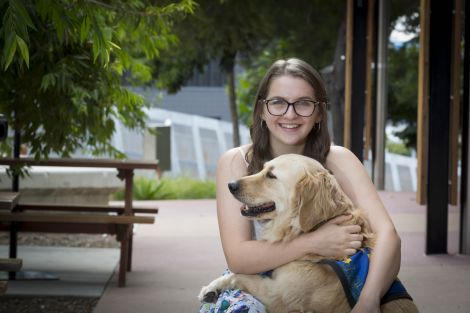Students have the right to make a complaint without fear of reprisal or detrimental treatment
Students wishing to make a complaint can act individually, anonymously or as a group to raise concerns that are up-to 12 months old. If the issue(s) is older than 12 months, the University is unable to investigate it, unless there are extenuating circumstances.
The resolution process may involve three steps as explained below. Staff and students are encouraged to resolve issues promptly, respectfully and at the lowest level of escalation possible.
Anonymous complaints
If you want to lodge a formal complaint and remain anonymous, you can submit the Anonymous Student Complaints Form. While the University treats such complaints seriously and we do our best to always protect your identity, we may be unable to:
- investigate such a complaint either fully or properly
- make a decision
- take action to resolve the complaint.
If you want to remain anonymous, please consider that you:
- may be identified from the details of your complaint, particularly if you are from a small student cohort
- will not receive correspondence about the outcome of your complaint unless you provide the University with an email address
- may be identified from the details listed in the email address provided.
Group complaints
Group complaints are accepted if, the issue(s) raised occurred within the last 12 months and all parties:
- are current students (includes students on approved Leave of Absence, Deferment or between enrolment periods)
- have the same concern(s)
- seek the same outcome(s)
- have provided consent to be included in the complaint submission.
Issues about the academic progress, marks, or grades of individual students, should not be raised through group complaints.

Accessibility adjustments
The University is committed to ensuring its complaints management is accessible. If you think there may be a reasonable adjustment that may help you (perhaps for a disability), please advise of this in your online complaint submission.
The information you provide will remain confidential and will only be used in the management of your complaint.

Need help and support with your complaint?
You can seek assistance with concerns from student advocates and other relevant support services before, during and after commencing the student complaints process outlined below.
Three-step process for making a complaint
Step 1: Self-guided resolution
As soon after the issue has occurred, attempt to resolve issues in good faith with the respective person or service area, if it is reasonable and appropriate to do so, before lodging a formal complaint.
To do this, you can:
- Have a conversation with or write to the individual or service area about your issues and the outcomes you seek. Be clear and respectful in your interactions with them.
- Provide qualitative feedback on improving service delivery via student feedback or the Student Experience of Teaching (SET) and Student Experience of a Course (SEC) surveys.
- If you are unsure how to raise issues with the relevant person or service area, student advocates and support services are available to assist you.
If you remain dissatisfied with the outcome and/or handling of your issues, you may proceed to Step 2 and make a formal complaint.
What to do if you cannot reach the relevant person
If you have contacted the relevant person and have not received a response, allow a reasonable period before following up with a courteous email or phone call.
Please consider that staff may be busy teaching other classes, attending meetings or other work-related engagements; they may be briefly absent or work on a part-time basis. Their ability to respond may therefore be delayed.
If you are unable to reach the relevant person, you can contact another relevant staff member. For example, if you cannot reach your tutor, you can contact your Course Convenor or Program Director for assistance.
Self-guided resolution contacts
Academic staff
- Approach the staff or academic group concerned directly. Browse the Griffith website or staff directory for contacts within the relevant school or department.
- Check the relevant course profile via the Program and Courses website or Learning@Griffith for course-related contacts.
- If you're unsure how to raise concerns with the relevant person or service area or feel unable to address challenging situations on your own, seek the assistance of a student advocate.
- If you are an English language student and the matter is specific to academic staff employed by GELI (Griffith English Language Institute), contact the Assistant Director of Studies (ADoS). Search for Assistant Director of Studies in the staff directory for contact details.
General/professional staff
- Approach the staff or academic group or service areas concerned directly. If unable to contact the relevant person, approach another officer in the relevant service area for assistance. Browse the Griffith website or staff directory for contacts within the relevant school or department.
- If you're unsure how to raise concerns with the relevant person or service area or feel unable to address challenging situations on your own, seek the assistance of a student advocate.
Individual or a group of students other than HDR (Higher Degree Research) candidates
- Approach the student or group concerned directly.
- If unable to raise the issues directly with the student(s) concerned, bring the behaviour to the attention of the Course Convenor (if it concerns another student in your course). Check the relevant course profile via the Program and Courses website or the Learning@Griffith for course-related contacts.
- If you are in a shared space of the University and the identity of the student(s) is unknown and you feel unsafe to approach the person, contact the Campus Support Team at the time of the event, or use student feedback to report the event.
Individual or a group of HDR candidates
- Approach the student or group concerned directly.
- If unable to raise your concerns with the student(s) concerned, bring the behaviour to the attention of the Course Convenor (if it concerns another student in your course). Check the relevant course profile via the Program and Courses website or the Learning@Griffith for course related contacts.
- If you are in a shared space of the University and the identity of the student(s) is unknown and you feel unsafe to approach the person, contact the Campus Support Team at the time of the event or use student feedback to report the event.
Student society/organisation
- Approach the person or group concerned directly.
- If unable to raise matters directly with the student(s) concerned, bring the behaviour to the attention of the relevant student organisation or association.
- For assistance with matters related to student organisations and associations at Brisbane campuses, contact the Student Associations Manager in Campus Life.
- For assistance with matters related to student organisations and associations at Gold Coast, contact the Student Guild.
- If you are in a shared space of the University and the identity of the student(s) is unknown and you feel unsafe to approach the person, contact the Campus Support Team at the time of the event or use student feedback to report the event.
Includes: learning and teaching matters, professional accreditation, placements and assessment
- Approach the staff or academic group concerned directly, such as your tutor or course convenor. If you are unable to reach the relevant person, approach your Program Advisor or Program Director. Check the relevant course profile via Program and Courses or Learning@Griffith for course-related contacts.
- Alternatively, use the student feedback and surveys to provide feedback.
- If unsure of how to raise concerns with the relevant person or service area or feel unable to address challenging situations on your own, seek the assistance of a student advocate.
Includes: Admissions, Enrolment and Fees, Credit, Examinations, Timetabling, Graduations, Student Connect and Student Centre
- Approach a front-line representative of the service area concerned directly. If unsure who to approach, contact Student Connect for advice. Alternatively, use student feedback.
- If you're unsure how to raise concerns with the relevant person or service area, or feel unable to address challenging situations on your own, seek the assistance of a student advocate.
International student support: International Admissions and Compliance, Global Mobility, International Finance (Financial Aid and Scholarships), and Student Experience
- Approach a front-line representative of the service area concerned within Griffith International directly or provide student feedback.
- If you're unsure how to raise concerns with the relevant person or service area, or feel unable to address challenging situations on your own, seek the assistance of a student advocate.
Student Health and Wellbeing: Counselling and Wellbeing, Health and Medical Services, Pastoral Care
- Approach a front-line representative of the service area concerned within Student Health, Counselling and Wellbeing directly or provide student feedback.
- If you're unsure of how to raise concerns with the relevant person or service area, or feel unable to address challenging situations on your own, seek the assistance of a student advocate.
Student Success Unit: Student Disability and Accessibility, Student Financial Support, Careers and Employment, Student Transitioning and Mentoring, Student Experience, and Griffith Honours College
- Approach a front-line representative of the service area concerned directly. Browse the Griffith website or staff directory for contacts within the relevant service area or provide student feedback.
- If you're unsure how to raise concerns with the relevant person or service area, or feel unable to address challenging situations on your own, seek the assistance of a student advocate.
Campus services: Accommodation, Griffith University residential colleges, sporting, food retail facilities, facilities management, parking and security
- Approach a front-line representative of the service area concerned within Campus Life directly or provide student feedback.
- If you're unsure how to raise concerns with the relevant person or service area, or feel unable to address challenging situations on your own, seek the assistance of a student advocate.
Transport services: Brisbane South (Nathan)–Brisbane South (Mt Gravatt) intercampus bus and Gold Coast–Brisbane South (Nathan) intercampus bus
- Approach a front-line representative of the service area concerned directly within the Intercampus Services or provide student feedback.
- If you're unsure how to raise concerns with the relevant person or service area, or feel unable to address challenging situations on your own, seek the assistance of a student advocate.
Information services: Library and learning resources, academic/learning/study support and IT services
- Approach a front-line representative of the service area concerned within Digital Solutions directly or provide student feedback.
- If you're unsure how to raise concerns with the relevant person or service area, or feel unable to address challenging situations on your own, seek the assistance of a student advocate.
Step 2: Make a formal complaint
Lodge a formal complaint via the Student Complaints Form, if your prior efforts have not helped resolve your issues.
Once received, complaints are forwarded to the responsible decision maker listed in Section 3.6 of the Student Complaints Procedure for attention and a formal response.
Within 24 hours of lodgement of the Student Complaints Form, the University acknowledges receipt of the form and advises of actions to be taken and the expected resolution timeframe. A written outcome is normally provided with 20 business days af receipt of the complaint, unless notified of any unforeseen delays.
If you remain dissatisfied with the outcome and/or handling of the formal complaint (Step 2), you may proceed to Step 3 and refer the matter to the Student Ombudsman.
Information you should provide when lodging a formal complaint
It is important that you include all relevant information and supporting documentation to assist the University to promptly address your issues. Please include the following information:
- Specific events—what happened?
- Dates—when did it happen?
- Names of the relevant people, school, or service area—who was involved?
- Efforts you have made to try to resolve the issue. Who did you talk to about your concerns? What was the outcome of that interaction?
- Explain why what has happened is unfair, unacceptable or has upset you.
- If your issues relate to a program of study or a course, provide the name and code of the program or course.
- If your issues are older than 12 months, indicate why you did not address them sooner and why they should be addressed now.
- Outline the outcomes you seek.
- Attach copies of related and available communication or documentation to help support your case.
Student Complaints Form
If you have attempted to resolve your issues and you remain dissatisfied with the outcome or handling of the matter, you may lodge a formal complaint.
Step 3: Refer the matter to the Student Ombudsman
If you have completed Step 2 but remain dissatisfied, you can refer the matter to the Student Ombudsman via the Student Ombudsman Referral Form no later than 10 working days from receipt of the Step 2 outcome.
Within 24 hours of lodgement of the Student Ombudsman Referral Form, the Griffith Student Ombudsman acknowledges receipt of the Complaint, advising of the actions to be taken and the timeframe for the process to review the outcome of the student’s Complaint. A written outcome is normally provided with 20 business days af receipt of the referral, unless notified of any unforeseen delays.
A referral to the Student Ombudsman is the last internal avenue for complaint within the University. If you remain dissatisfied with the outcome and/or handling of the Student Ombudsman Referral (Step 3), you may lodge a complaint with the National Student Ombudsman for an external review.
Information you should provide when referring a complaint to the Student Ombudsman
It is important that in your referral submission, you provide all the relevant information and supporting documentation to assist the Student Ombudsman to promptly address your issues. Please include the following information:
- Specific events—what happened?
- Dates—when did it happen?
- Names of the relevant people, school, or service area—who was involved?
- Explain why you believe what has happened is unfair, unacceptable or has upset you.
- Explain why you are dissatisfied with the outcome and/or the handling of your formal complaint (Step 2).
Student Ombudsman Referral Form
If you have lodged a formal complaint and you remain dissatisfied with the outcome or handling of the matter, you may proceed to refer your complaint to the Student Ombudsman.
Withdrawing a complaint
You may request in writing the withdrawal of a complaint at any time during the complaints process to the relevant University staff member, Student Complaints or the Student Ombudsman. Notwithstanding this, the University reserves the right to continue to investigate a complaint if required to do so to satisfy other requirements or protect its own interests.

Student Charter Framework
The Student Charter is a framework that outlines the University’s aspirations and mutual expectations of employees
and students as they work together.

Student Complaints Policy
This policy provides the mechanism for resolving student complaints about the quality of University service and treatment, or the conduct of University staff or students.

Student Complaints Procedure
This procedure supports the Student Complaints Policy.